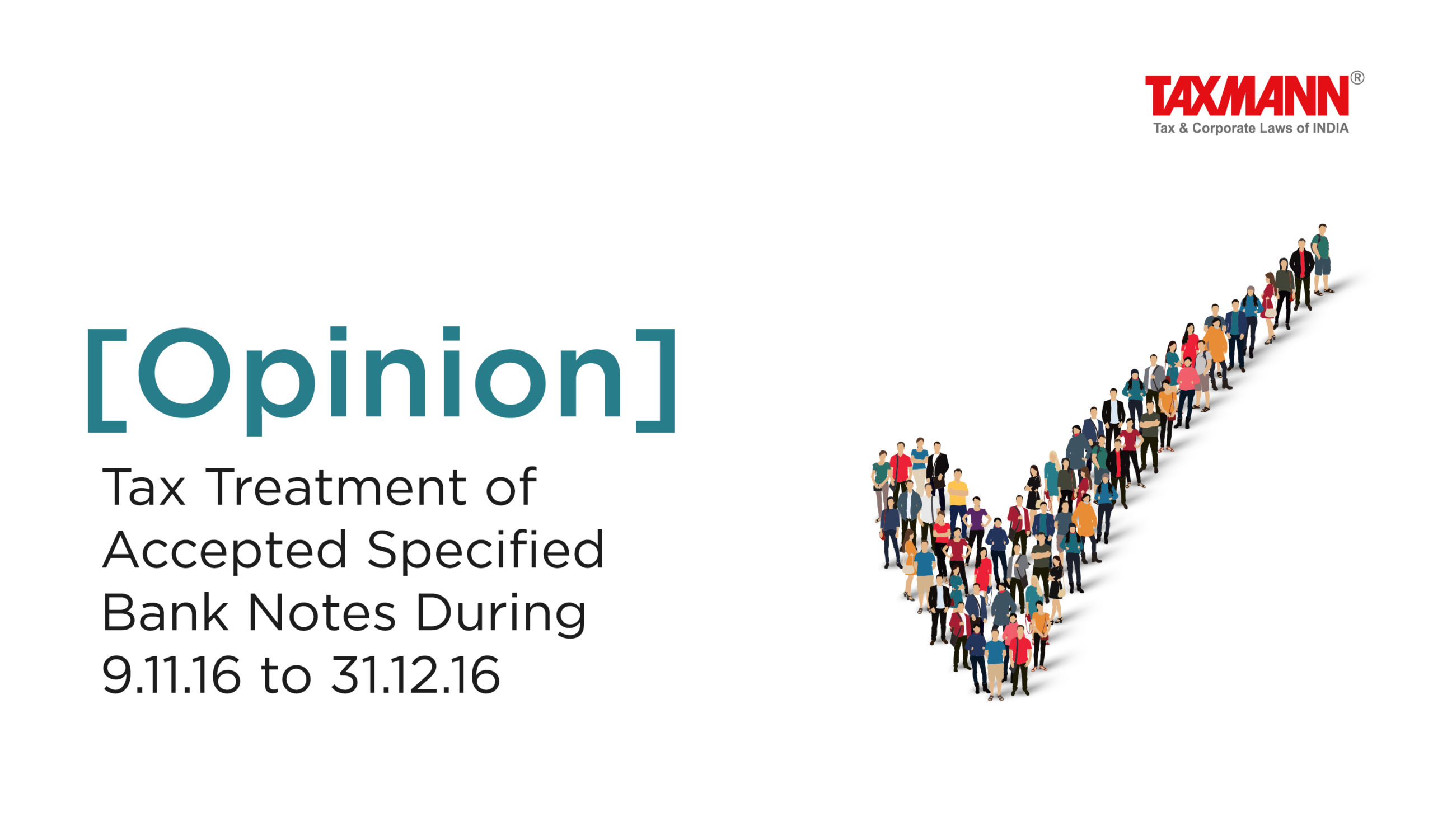[Opinion] Tax Treatment of Accepted Specified Bank Notes During 9.11.16 to 31.12.16
- News|Blog|Income Tax|
- 2 Min Read
- By Taxmann
- |
- Last Updated on 10 August, 2023

CA S K Pransukhka – [2023] 153 taxmann.com 1 (Article)
By notification no 2652 dt 8.11.16, Currency notes of Rs 500 and Rs 100(In short “SBN”) notes were withdrawn and ceased to be legal tender for avowed objective to obviate menace of fake currency , unaccounted wealth .
One of the natural question arose as to what shall be the tax treatment of SBNs held as on midnight of 8th Nov 2016 and prior to that . The Govt through various notification allowed exchange of SBNs up to Rs 4000 at bank counters , deposit in to KYC complaint bank account without any limit and allowed usage in exempted institutions like , petrol pumps, Hospitals with certain restrictions .
In view of this , it was widely accepted that SBNs held on midnight of 8.11.16 and prior to that from business proceeds , can well be accepted and deposited in bank accounts. However , to check that no person deposit the unaccounted income earned prior to 8.11 16 and at the same time , to check the assessing authorities from taking adverse view on legitimate deposit of cash , CBDT came out with various instructions for guidance of assessing authorities .
The 1st of such instruction was issued on 21/02/2017 by instruction number 03/2017. The 2nd instruction was issued on 03/03/2017 no. 4/2017. The 3rd instruction was in the form of a circular dated 15/11/2017 in F.No. 225/363/2017-ITA.II and the last one dated 09/08/2019 I F.no.225/145/2019-ITA.II. These instructions gives a hint regarding what kind of investigation, enquiry, evidences that the assessing officer is required to take into consideration for the purpose of assessing such cases.
In one of such instructions dated 09/08/2019 speaks about the comparative analysis of cash deposits, cash sales, month wise cash sales and cash deposits. It also provides that whether in such cases the books of accounts have been rejected or not where substantial evidences of vide variation be found between these statistical analyses. Therefore, it is very important to note that whether the case of the assessee falls into statistical analysis, which suggests that there is a booking of sales, which is non-existent and thereby unaccounted money of the assessee in old currency notes (SBN) have been pumped into as unaccounted money.
The instruction dated 21/02/2017 that the assessing officer basic relevant information e.g. monthly sales summary, relevant stock register entries and bank statement to identify cases with preliminary suspicion of back dating of cash and is or fictitious sales. The instruction is also suggested some indicators for suspicion of back dating of cash else or fictitious sales where there is an abnormal jump in the cases during the period November to December 2016 as compared to earlier year. It also suggests that, abnormal jump in percentage of cash trails to on identifiable persons as compared to earlier histories will also give some indication for suspicion. Non-availability of stock or attempts to inflate stock by introducing fictitious purchases is also some indication for suspicion of fictitious sales. Transfer of deposit of cash to another account or entity, which is not in line with the earlier history.
Click Here To Read The Full Article
Disclaimer: The content/information published on the website is only for general information of the user and shall not be construed as legal advice. While the Taxmann has exercised reasonable efforts to ensure the veracity of information/content published, Taxmann shall be under no liability in any manner whatsoever for incorrect information, if any.

Taxmann Publications has a dedicated in-house Research & Editorial Team. This team consists of a team of Chartered Accountants, Company Secretaries, and Lawyers. This team works under the guidance and supervision of editor-in-chief Mr Rakesh Bhargava.
The Research and Editorial Team is responsible for developing reliable and accurate content for the readers. The team follows the six-sigma approach to achieve the benchmark of zero error in its publications and research platforms. The team ensures that the following publication guidelines are thoroughly followed while developing the content:
- The statutory material is obtained only from the authorized and reliable sources
- All the latest developments in the judicial and legislative fields are covered
- Prepare the analytical write-ups on current, controversial, and important issues to help the readers to understand the concept and its implications
- Every content published by Taxmann is complete, accurate and lucid
- All evidence-based statements are supported with proper reference to Section, Circular No., Notification No. or citations
- The golden rules of grammar, style and consistency are thoroughly followed
- Font and size that’s easy to read and remain consistent across all imprint and digital publications are applied



 CA | CS | CMA
CA | CS | CMA
